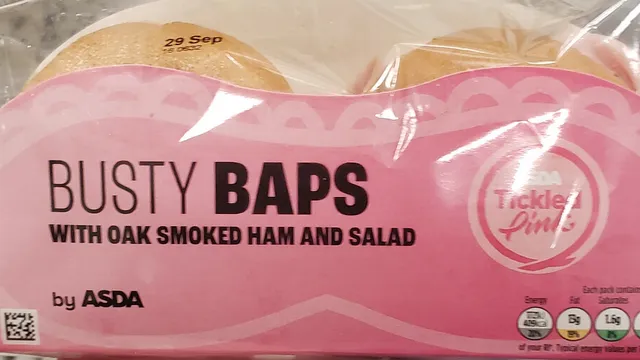
Asda's Busty Baps campaign sparks backlash for poor taste
2024-10-01 09:25- Asda's Tickled Pink campaign for Breast Cancer Awareness Month features over 200 pink products, including Nestle's Shreddies and Lurpak butter.
- The rebranding of Asda's oak-smoked ham and salad rolls as 'Busty Baps' has faced significant backlash on social media for being in poor taste.
- The controversy highlights the ongoing debate about the appropriateness of humor in health awareness campaigns, with mixed opinions on its effectiveness.
Express your sentiment!
Insights
In the UK, Asda has launched its Tickled Pink campaign for Breast Cancer Awareness Month, marking its 27th year of partnership with charity initiatives. This year, over 200 products have been rebranded in pink, including popular items like Nestle's Shreddies and Lurpak butter. However, one particular product, Asda's oak-smoked ham and salad rolls, has sparked controversy due to its rebranding as 'Busty Baps'. The name has drawn criticism on social media for being in poor taste and trivializing a serious issue. Many users expressed discomfort, highlighting the sexualization of breasts and its insensitivity towards women who have undergone mastectomies. Despite the backlash, some argue that the provocative name has succeeded in generating discussion and raising awareness about breast cancer. Asda's spokesperson defended the campaign, stating that the intention was to encourage conversations about breast cancer and promote self-checking. The campaign has received mixed reactions, reflecting the ongoing debate about the appropriateness of humor in health awareness initiatives.
Contexts
In the realm of public health communication, the use of humor has emerged as a powerful tool to engage audiences and promote health awareness. Recent studies suggest that humor can serve as an effective hook, drawing attention to topics that are often overlooked or misunderstood. For instance, in the case of advance care planning—a subject that many find daunting—humorous messaging has shown to significantly increase both the acceptability and persuasiveness of the information presented. This innovative approach challenges the conventional wisdom that serious topics must be treated with utmost gravity. A scoping review of 17 experimental studies revealed that humor appeals can enhance the effectiveness of health promotion materials. In one notable study, humorous posters about advance care planning attracted significantly more attention than their non-humorous counterparts. The loss-framed and gain-framed humorous posters achieved attention rates of 51% and 49%, respectively, compared to just 39% for the non-humorous version. This indicates that humor not only makes the message more engaging but also helps to break down barriers of resistance that often accompany unfamiliar health topics. However, the effectiveness of humor is not universal. While it proved beneficial in the context of advance care planning, other health topics, such as cancer screening and smoking cessation, did not yield the same positive results. In these cases, humor led to a decline in overall scores, suggesting that the audience and type of humor must be carefully considered to avoid undermining the message. As public health communicators strive to encourage proactive health behaviors, the integration of humor into their strategies offers a fresh perspective. By rethinking traditional communication methods, they can foster a more engaging dialogue around health issues, ultimately empowering individuals to take charge of their health in a more approachable and less intimidating manner.